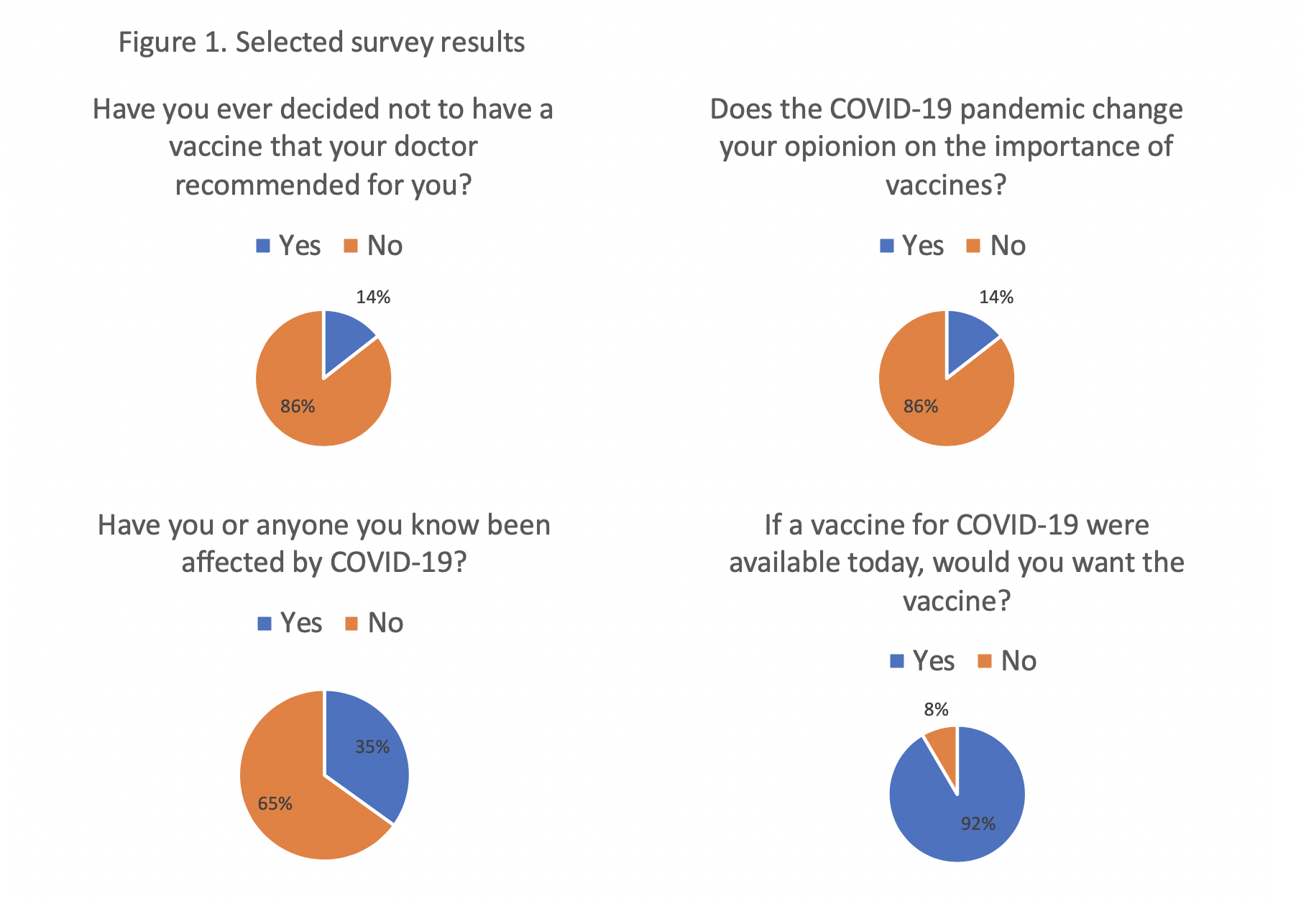Session Information
Date: Friday, November 6, 2020
Title: Patient Outcomes, Preferences, & Attitudes I: COVID-19 (0464–0468)
Session Type: Abstract Session
Session Time: 5:00PM-5:50PM
Background/Purpose: Vaccinations are an important component of care in rheumatology as many patients are immunocompromised by treatment therapies. Patients are sometimes reticent to receive recommended vaccinations for various reasons. A contributing reason could be an under-appreciation of the positive protective benefit of vaccinations. We hypothesize that patients’ experience with the COVID-19 pandemic may shift this understanding.
Methods: On April 15, 2020, a link to an anonymous online survey was sent to patients cared for in an academic outpatient rheumatology clinic (RO) via the protected electronic medical record email communication system. Formal institutional review board (IRB) approval was obtained for completion of anonymous surveys. As this research was low risk, this study qualified for IRB exemption. Statistical analysis included two-tailed Fisher exact test and binary Poisson regression.
Results: A total of 83 patients responded to the survey. Most were female. The majority had “rheumatoid arthritis or other autoimmune arthritis” (Table 1). 34.9% (n = 29) had been, or knew someone who had been, affected by COVID-19. 14.5% (n = 12) reported that COVID-19 had changed their opinion on the importance of vaccinations. There was no association between age group, gender, or diagnosis and having a changed opinion on the importance of vaccinations. Those who were affected or knew someone affected by COVID-19 were less likely to change their opinion on the importance of vaccinations due to COVID-19 (p=0.049). However, those who had ever declined a vaccination recommend by their doctor were almost three times more likely to change their opinion on the importance of vaccinations due to the COVID-19 pandemic (RR = 2.96, 95% CI [1.05 – 8.36]). 85.5% (n = 71) reported full compliance with previous vaccination recommendations by their doctor and 97.8% (n = 76) reported that they were now “likely” or “very likely” to have a vaccine recommended by their doctor; there was not a statistically significant difference when comparing these responses (p = 0.059). When asked if participants would want a COVID-19 vaccine were it available today, 8.4% (n = 7) would decline. When asked if participants would want a COVID-19 vaccine for their child, were it available today, 3.6% (n = 3) would decline (Figure 1).
Conclusion: Based on this research, most patients in an academic rheumatology clinic would desire a COVID-19 vaccination were it available today, both for themselves and for their children. Personal experiences or exposure to COVID-19 did not change opinions on the importance of vaccinations. However, patients who had previously opted to forgo vaccinations, were more likely to change their opinion on the importance of vaccinations due to the COVID-19 pandemic. Although it did not reach statistical significance, there is a trend towards patient expressed intention of compliance with vaccination recommendations after the COVID-19 pandemic. This research suggests that the COVID-19 pandemic may positively affect the likelihood of patients with chronic rheumatologic disease to value and comply with vaccination recommendations offered by their doctor.
 Figure 1. Selected survey results
Figure 1. Selected survey results
To cite this abstract in AMA style:
Overbury R, Stoddard G, Frech T. The COVID-19 Pandemic and Its Effect on Patients with Chronic Rheumatologic Disease Regarding the Value of Vaccination Recommendations [abstract]. Arthritis Rheumatol. 2020; 72 (suppl 10). https://acrabstracts.org/abstract/the-covid-19-pandemic-and-its-effect-on-patients-with-chronic-rheumatologic-disease-regarding-the-value-of-vaccination-recommendations/. Accessed .« Back to ACR Convergence 2020
ACR Meeting Abstracts - https://acrabstracts.org/abstract/the-covid-19-pandemic-and-its-effect-on-patients-with-chronic-rheumatologic-disease-regarding-the-value-of-vaccination-recommendations/

